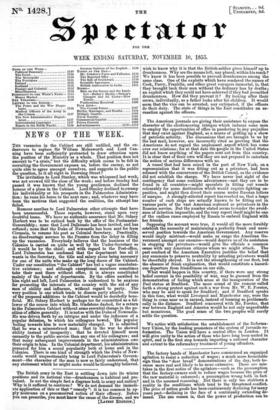NEWS OF THE WEEK.
THE vacancies in the Cabinet are still unfilled, and the en- deavours to replace Sir William Molesworth and Lord Can- ning have been sufficiently protracted to draw attention upon the position of the Ministry as a whole. That position does not amount to " a crisis," but the difficulty which seems to be felt in recruiting the Government exposes us, before the enemy, as not quite able to agree amongst ourselves, and suggests to the public the question, Is it all right in Downing Street ? The invitation to Lord Stanley, which was whispered last week, was not avowed till the close of the week; and before Sunday had passed it was known that the young gentleman declined the honour of a place in the Cabinet. Lord Stanley declined to swamp his individuality or his prospects in the Palmerston Administra- tion: he runs his horse in the next race ; and, whatever may have been the motives that suggested the coalition, the attempt has failed.
Rumour ascribes to Lord Palmerston other attempts that have been unsuccessful. Those reports, however, stand upon very doubtful bases. We have no authentic assurance that Mr. Sidney Herbert was to be enticed bank by the offer of the Postmaster- Generalship ; none. that Lord Dalhousie has been invited, and has refused; none that the Duke of Newcastle has been sent for from Circassia, to resume his post as Colonial Secretary. Practically, no disadvantage accrues to the Premier from the delay in filling up the vacancies. Everybody. believes that the business of the Colonies is carried on quite as well by the Under-Secretary as it would be by the chief; and with regard to the Post-office, Lord Palmerston has confessed that the department has all it wants in the Secretary, the title and salary alone being necessary for one of the units who make up the long dozen of the Cabinet. Under our constitution "the Cabinet" has but a vague unsubstan- tive existence ; and although exceptional members sometimes take their seat there without office, it is always constituted mainly of the heads of departments. By the offers ascribed to him right and left, Lord Palmerston is understood to be anxious for promoting the interests of the country with the aid of any men of ability and influence, without regard to party. The very position is one which tends to disarm party attacks. Some of the proposed additions to the Cabinet would be decidedly bene- ficial. Mr. Sidney Herbert is perhaps too far committed as a fol- lower of the course into which Mr. Gladstone dashed, for a return to the Palmerston Cabinet without some essential change in the po- sition of affairs generally. It is not so with the Duke of Newcastle. He was driven forth by an intrigue and under the influence of a popular delusion, to which his colleagues bowed. The popular feeling towards him is now materially changed. It is admitted that he was a misconstrued man; that in the war he showed ability instead of incapacity ; that he devoted himself more earnestly to the public service than any one of his colleagues; and that many subsequent improvements in the administration owe their origin to him. In the Colonial department, his administration procured for him a sound popularity both at home and in the Colonies. There is one kind of strength which the Duke of New- castle would unquestionably bring to Lord Palmerston's Govern- ment—the character of the man is now so fairly understood, that any statement which he might make would be thoroughly believed.


























